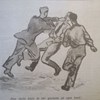centrality
Axiological Retributivism and the Desert Neutrality Paradox
Campbell, T. Axiological Retributivism and the Desert Neutrality Paradox. Philosophies 2022, 7, 80. https://doi.org/10.3390/philosophies7040080 Abstract: According to axiological retributivism, people canan outcome in which someone gets what she deserves, even if it is bad for her, can thereby haveintrinsic positive value. A question seldom asked is how axiological retributivism should deal withcomparisons of outcomes that differ with respect to the number and identities of deserving agents.Attempting to answer this question exposes a problem for axiological retributivism that parallels awell-known problem in population axiology introduced by John Broome. The problem for axiologicalretributivism is that it supports the existence of a range of negative wellbeing levels such that if adeserving person comes into existence at any of these levels, the resulting outcome is neither betternor worse with respect to desert. However, the existence of such a range is inconsistent with a setof very plausible axiological claims. I call this the desert neutrality paradox. After introducing theparadox, I consider several possible responses to it. I suggest that one reasonable response, thoughperhaps not the only one, is to reject axiological retributivism.
Katie Steele: Neutrality about creating good lives - No panacea for longtermism
Place: At the Institute for Futures Studies, Holländargatan 13, Stockholm, or online.REGISTERAbstractThe principle of neutrality can be seen as a direct response to the totalistapproach to evaluating popu

Katie Steele: Neutrality About Creating Good Lives - No Panacea For Longtermism
The principle of neutrality can be seen as a direct response to the totalist approach to evaluating populations of varying constitution and size: while the latter holds that the addition of a good lif
Why Inflicting Disability is Wrong: The Mere Difference View and The Causation Based Objection
I The Oxford Handbook of Philosophy and Disability, Adam Cureton and David Wasserman (eds). Oxford: Oxford University Press (2020) Abstract This Handbook introduces philosophers, as well as other scholars
Identification of influential spreaders in complex networks
2010. Nature Physics 6:888-893. AbstractNetworks portray a multitude of interactions through which people meet, ideas are spread, and infectious diseases propagate within a society. Identifying the most
Criminal nomads: The role of multiple memberships in the criminal collaboration network between Hells Angels MC and Bandidos MC
Global Crime vol. 23, no 2 Abstract Outlaw motorcycle gangs (OMGs) have received increased atten-tion from both law enforcement agencies and the research com-munity. This study investigates the criminal
The complexity of crime network data: A case study of its consequences for crime control and the study of networks.
PLoS ONE 10(3): e0119309., doi:10.1371/journal.pone.0119309 Abstract The field of social network analysis has received increasing attention during the past decades and has been used to tackle a variety o
How Valuable are Chances?
Philosophy of Science, Vol. 82, No. 4, p. 602-625. DOI: 10.1086/682915 Abstract Chance Neutrality is the thesis that, conditional on some proposition being true (or being false), its chance of being true
Asymmetries in punishment propensity may drive the civilizing process
Nature Human Behaviour, volume 2, pp. 148–155, doi:10.1038/s41562-017-0278-z Abstract Norms about hygiene and violence have both shown a tendency to become increasingly strict, in the sense that the han

Lag eller näve? Intervju med Victor Lundberg och Johan A Lundin om SSU och en antifascistisk kamp
Historikerna Johan A Lundin och Victor Lundberg intervjuas av Gustaf Arrhenius och Erika Karlsson om sin artikel "Med ett våldsamt knytnävsslag och en välriktade spark? SSU och den nazistiska utmaning








